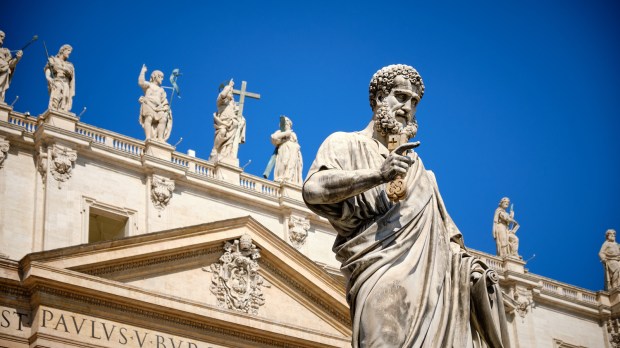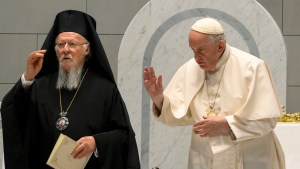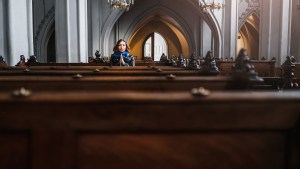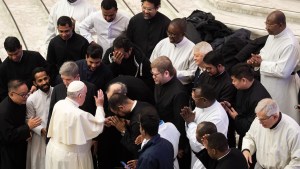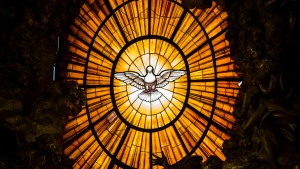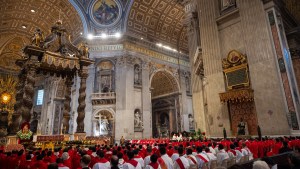On June 20, 2023, the Synod of Bishops published a working document that is to guide the first session of the Synod on the future of the Church, scheduled for October 2023. This “Instrumentum Laboris” (“instrument of work” in Latin), is intended to help the synodal assembly’s 370 members in their reflection on a more welcoming and missionary Church.
Among the most salient topics mentioned in the 50-page document is the Church’srelationship with authority, the role of women, and the welcoming of wounded minorities.
The document is divided into two sections. The first recalls the “fundamental characteristics” of a synodal Church, capable of “walking together.” The second section is supposed to encourage the reflection of the participants of the October assembly – bishops, religious and laity – through more than 130 questions divided into 15 worksheets. These questions are centered on the topics that have emerged from the reflections carried out from 2021 onwards at the local and then continental level.
I.MEDIA goes through the main themes.
The question of authority
The question of a synodal Church with greater participation of the laity, runs up against the question of authority. Who decides in the Church, and how? The working document is peppered with this question, which is also found in the various worksheets. The authors consider authority as one of the three priorities that emerged from the continental stage. The text highlights this concern: “Does authority arise as a form of power derived from the models offered by the world, or is it rooted in service?”
The stakes of this question are not insignificant, as the continental assemblies have denounced that “power and decision-making processes have been appropriated by some in positions of authority and responsibility.” They said these phenomena led to the “different forms of abuse (sexual, financial, spiritual and of power)” that have come to light in the Church in recent decades. “Is the responsibility for mishandling cases of abuse individual or systemic?” the document asks, underlining the need to rethink governance.
Indeed, the call for transparency calls into question “the way the bishop’s ministry is exercised.” As if echoing the debates that have been evoked during the German synod in recent years, the members of the universal synod want to examine the “degree of doctrinal authority” to be attributed to bishops’ conferences, or to a continental assembly. In the future there could be “changes in canon law,” the text suggests.
The document also mentions cases “in which those in authority feel they cannot confirm the conclusions reached by a community discernment process, taking a decision in a different direction.” The text asks “when might a bishop feel obliged to take a decision that differs from the considered advice offered by the consultative bodies” and questions “the basis for such a decision.” Like at the Continental Synod in Prague last February, the document wonders whether bishops should discern “separately from the other members of the People of God.”
To assert that “the Church is, at the same time, synodal and hierarchical” seems challenging, or at least raises a number of dilemmas. The authors do not rule out the possibility that this theme may “affect our understanding of authority in the Church at different levels, including that of the Bishop of Rome.” They envisage cases where local Churches may take “different approaches,” prompting a reflection on the Pope’s role in safeguarding “unity,” or on the possibility “for a variety of approaches between different regions.”
Creating spaces to be able to listen to those wounded by the Church
The working document also highlights the “open wounds” within the Church, which have been highlighted during the various stages of the Synod. A section of the text lists categories of people and minorities who may feel excluded from the Church. These include “LGBTQ+ people,” divorced and remarried people, those in polygamous relationships, or also victims of discrimination linked to ethnic or racial identity.
The document invites us to think of spaces in which those who feel “unwelcomed by the community” can “feel recognized, received, free to ask questions, and not judged.” Concerning those who feel excluded because of their status or sexuality, the authors of the text emphasize that the Church is not starting from scratch, and that, for example, the 2016 apostolic exhortation Amoris Laetitia on the family should inform future reflections. The members of the October synodal assembly can thus consider the “concrete measures” needed to reach these groups of people by basing themselves off this exhortation as well.
Putting the poor and migrants at the center
“In a synodal Church, the poor, in the primary sense of those living in conditions of material poverty and social exclusion, occupy a central place,” the working document emphasizes. The text links “the service of charity and commitment to justice and care for our common home” with bringing those who are disadvantaged to full participation, and not simply recipients of assistance. The poor are “bearers of the Good News that the whole community needs to hear. The Church has something to learn and receive from them,” the document says.
“Migratory movements are a sign of our time” and “an invitation to experience the variety of the Church,” particularly through the diaspora of Eastern Catholic Churches, the text also explains. Participants in the synodal assembly are invited to consider the place of migrant communities in ordinary pastoral life, and the links to be forged between countries of departure and arrival. “Tensions and misunderstandings that may arise between believers of different cultures and traditions,” due to the increase of migratory movements and globalization, should be “handled constructively.”
The Church is thus invited to be “a prophetic witness to a fragmented and polarized world.” “Does the Christian community know how to accompany society as a whole in building the common good, or does it seek to defend only its own vested interests?” the document prompts. The text also raises the question of the “criteria of discernment” that should be used to evaluate the involvement of Christians in political life and their possible participation in coalitions.
A ‘de-Westernized’ Church?
“There is no border that this movement of the Spirit does not feel compelled to cross, to draw all into its dynamism,” the working document states. The text emphasizes that “communion is not a sociological coming together as members of an identity group but is above all a gift of the Triune God, and at the same time a task, which is never exhausted, of building the ‘we’ of the People of God.”
The text therefore calls for the traditions of the Eastern Churches to be better heard and recognized “in an ecclesial and theological conversation often dominated by Latin/Western voices.” Ecumenism is also presented as a “laboratory of synodality.” In the context of relations with the Orthodox Churches, the document invites to reflect on “spiritual processes of repentance, forgiveness and reconciliation in a dialogue of conversion that can lead to a healing of memory.”
The dialogue with other religions is not treated with idealism in the text, as the document acknowledges the “difficulties, limitations, and indications of mistrust” that may emerge and even lead in some cases to “conflict and direct or indirect persecution.” Participants in the synodal assembly are therefore called upon to “engage Western culture and other cultures, including within the Church, in a manner that is frank, prophetic and constructive, and avoiding all forms of colonialism.”
Women’s diaconate
“The Continental Assemblies were unanimous in calling for attention to the experience, status and role of women, notwithstanding the different perspectives present within each continent,” the working document states, highlighting the “baptismal dignity of women.” The text also emphasizes the “desire for a greater presence of women in positions of responsibility and governance,” as well as close cooperation between men and women.
The document encourages the members of the synodal assembly to think of solutions for these demands, in particular by combating abuse and “all forms of discrimination and exclusion faced by women in the Church and society.” It also raises the question of the participation of women in “ministries at all levels of the Church,” and wonders whether the “question of women’s inclusion in the diaconate” can “be considered.”
Women’s diaconate sees to have been ruled out by the Pope in the apostolic exhortation Querida Amazonia in February 2020. However, the Pontiff asked a new commission to look into the matter in April of the same year.
Ordination of married men and synodal formation of seminarians
The document calls to invest in the “formation” – the term appears 32 times in the text – of the synodal method and in particular in the “Conversation in the Spirit.” The aim is to create “facilitators capable of accompanying communities in practicing” this prayer-dialogue method.
For example, the text promotes training in “cultural discernment” that can take into account “local sensibilities.” The document also calls for a reflection against clericalism and in how to exercise authority. “How can we renew an understanding of ministry not limited to ordained Ministry alone?” the document asks.
The document reintroduces as a question for reflection one of the requests that had been discussed at the Amazon Synod in 2019: that of the ordination of married men, under the category of ‘viri probati’. This request had not been accepted by the Pontiff in his apostolic exhortation Querida Amazonia (2020). Nevertheless, the document asks whether, “as some continents propose, […] a reflection could be opened concerning the discipline on access to the Priesthood for married men, at least in some areas.”
“We need integral formation, initial and ongoing, for all members of the People of God,” the document insists, emphasizing especially the need for a better formation for seminarians. “Candidates for ordained Ministry must be trained in a synodal style and mentality,” the text says, as it describes this formation as “at the heart of the renewal of the Church.” Last but not least, the document stresses that this could also help to fight abuse cases more effectively.
Developing a new language
The working document also clearly encourages to “renew the language used by the Church in its liturgy, preaching, catechesis, sacred art, as well as in all forms of communication addressed to the Faithful and the wider public.” This is to make “the mystery that the Church proclaims or the richness of its tradition” more “accessible and attractive to the men and women of our time.” Many “feel excluded by the language adopted in Church contexts,” the text explains.
In particular, the working document highlights the contribution of the Digital Synod, an online consultation of 110,000 people from all over the world, carried out during the first phase of the synod process and supported by “Catholic influencers.” This report helped reflect on digital technology, its “potential” in terms of evangelization, synodal discernment and ecumenical and interreligious dialogue, while also not forgetting the “anthropological” challenges of this field.
